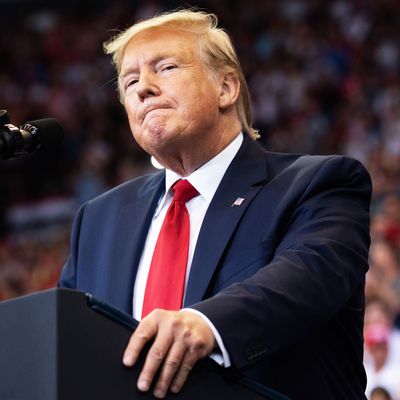
The decision by several leading Democratic candidates to endorse unpopular positions has justifiably attracted a lot of attention. Yet Donald Trump’s unpopular positions have received considerably less attention. In part this is because Democratic presidential candidates are directing much of their fire at each other rather than at Trump, and in part it’s because Trump’s scandals and aberrant behavior have blotted out his policy stances.
But the fact is that Trump’s agenda itself has come in for shockingly little criticism from his opponents even though it presents enormously vulnerable targets. Here’s one example you probably haven’t heard: Trump has raised taxes on the middle class even while cutting them on the rich.
This devastating fact is hiding in plain sight. Trump has imposed tariffs on hundreds of billions of dollars’ worth of goods. Tariffs are a kind of tax. They are heavily regressive. Yesterday he announced yet another middle-class tax hike in the form of new tariffs on $300 billion worth of goods imported from China.
The conservative Tax Foundation estimates that Trump’s previous tariffs had cost the typical American family more than $850. The new round of tariffs will push that figure over $1,000.
Raising taxes on the middle class is an idea so unpopular that pollsters rarely bother to measure it. A 2003 poll found just 3 percent of the public believes the middle class pays less than its fair share. A 2017 poll asking which groups should pay more taxes found an identical 3 percent that agreed that “middle-class Americans” should.
Obviously, the issue is never going to play out in a 97 percent to 3 percent way in a live political debate. Trump will continue to deny that his tariffs are borne by middle-class Americans and most Trump supporters will believe him. The question, as with any political attack, is how it will play with crucial groups of persuadable voters in the middle.
The charge of raising taxes on the middle class might be potent with them because, first, it’s undeniably true, and second, Trump has also given rich people a huge tax cut. Raising middle-class taxes at the same time you’re giving a huge windfall to business owners and the heirs to massive fortunes is an especially noxious combination.
So why haven’t Democrats pounded home this message? One reason may be that, since Trump has managed to impose his taxes through the legally shaky mechanism of executive authority, he has avoided a congressional debate that would highlight its vulnerabilities. One also suspects that Trump’s opponents are suffering from a residual belief that Trump’s trade agenda, of which the tariffs are a piece, is highly popular, and thus reluctant to debate him on his favored terms. But the fact is that public opinion has swung in a heavily positive direction on free trade:
The Media has covered Trump’s tariffs largely in relation to its risks to the overall economy and the stock market. Reporters aren’t going to frame it primarily as a tax hike on the middle class unless Democrats start driving home that message.































